
From Gambling to Gaming: The Reality of Non-Substance Related Addictions
In the modern era, addiction has evolved beyond the conventional boundaries of substance abuse. Non-substance-related addictions, also known as behavioural addictions, have gained significant recognition among mental health professionals and researchers. These addictions involve a compulsive engagement in behaviours that provide short-term pleasure or relief but lead to long-term negative consequences. As awareness grows, the need for specialised education and training in addressing these complex issues has become more critical than ever.
Gambling Addiction
Gambling addiction, or compulsive gambling, is one of the most well-documented behavioural addictions. It is characterised by an overwhelming urge to gamble despite harmful consequences. This addiction often leads to financial ruin, relationship breakdowns, and severe emotional distress. Studies have shown that gambling addiction can trigger similar brain responses as those seen in substance abuse, reinforcing the need for specialised treatment approaches.
Internet and Gaming Addiction
The digital age has ushered in new forms of addiction, with internet and gaming addiction becoming increasingly prevalent. Individuals with this addiction may spend excessive hours online, often to the detriment of their personal, academic, or professional lives. Symptoms include a preoccupation with online activities, withdrawal symptoms when not online, and an inability to control usage. The psychological impact of internet and gaming addiction necessitates a deep understanding of digital media’s role in mental health.

Food Addiction
Food addiction involves an unhealthy relationship with food, characterised by compulsive overeating or binge eating. Unlike other behavioural addictions, food addiction directly affects physical health, leading to obesity and associated health problems such as diabetes and heart disease. Psychological consequences include guilt, shame, and low self-esteem. Effective treatment requires a multidisciplinary approach that addresses both the psychological and physical aspects of the addiction.
Shopping Addiction
Also known as compulsive buying disorder, shopping addiction is characterised by an uncontrollable urge to shop, leading to financial problems and emotional distress. Individuals may shop to cope with stress, loneliness, or depression, finding temporary relief in the act of purchasing. However, this relief is short-lived, and the negative consequences often outweigh the momentary pleasure. Understanding the underlying psychological triggers is crucial for effective intervention.
Work Addiction
Work addiction, or workaholism, is a condition where an individual becomes obsessed with their work to the detriment of their health, relationships, and well-being. Unlike other addictions, workaholism is often socially reinforced and even praised, making it harder to recognise and treat. Symptoms include a constant preoccupation with work, an inability to detach from work-related activities, and neglect of personal life. Addressing work addiction requires a balanced approach that promotes healthy work-life integration.
Psychological Mechanisms Behind Non-substance Related Addictions
Non-substance-related addictions share several psychological mechanisms with substance abuse disorders. These include the activation of the brain’s reward system, which releases dopamine and creates a cycle of pleasure and reinforcement. Over time, individuals develop tolerance, needing more of the behaviour to achieve the same effect and experience withdrawal symptoms when deprived of the behaviour. Understanding these mechanisms is essential for developing effective treatment strategies.
Treatment Approaches
Cognitive-behavioural therapy (CBT)
Cognitive-behavioural therapy is one of the most effective treatment approaches for non-substance-related addictions. CBT helps individuals identify and challenge distorted thinking patterns and develop healthier coping mechanisms. By addressing the underlying cognitive processes, CBT provides tools for long-term recovery and relapse prevention.
Mindfulness and Stress Management
Mindfulness-based therapies and stress management techniques are increasingly used to treat behavioural addictions. These approaches help individuals become more aware of their thoughts and behaviours, reducing the automaticity of addictive actions. Stress management techniques, such as meditation and relaxation exercises, provide alternative ways to cope with stress and anxiety.
Support Groups
Support groups, such as Gamblers Anonymous or Overeaters Anonymous, offer a community-based approach to recovery. These groups provide a platform for individuals to share experiences, gain support, and develop a sense of accountability. The communal aspect of support groups can be particularly beneficial in reducing feelings of isolation and promoting sustained recovery.
The Importance of Specialised Education
Non-substance-related addictions pose significant challenges to individuals and society. Understanding these addictions, their mechanisms, and effective treatment approaches is crucial for addressing the growing problem. By enrolling in our B.A. (Hons) in Counselling & Psychotherapy with Addiction Studies, you can become part of the solution, gaining the expertise needed to support individuals on their journey to recovery. Join us in making a difference and advancing the field of addiction studies.






















